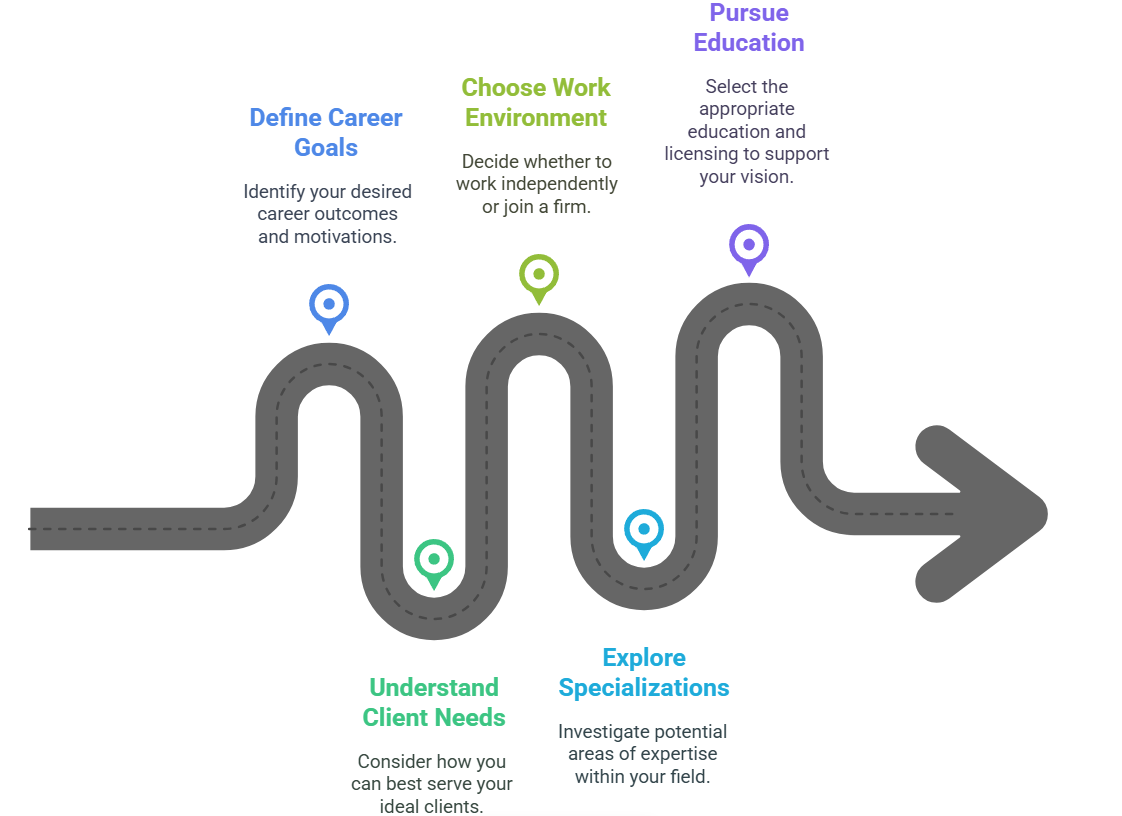
How to Become a Financial Advisor: Your Roadmap to Success
Are you eager to learn how to become a financial advisor and help people secure their financial futures? We get it, there is something incredibly rewarding about guiding families, entrepreneurs, or retirees toward long-term wealth. In fact, the field continues to grow at a steady pace (projected at 13% from 2022 to 2031, according to Investopedia).
Below, we have put together a step-by-step roadmap. Whether you are a fresh graduate or a seasoned professional making a career pivot, we hope our insights will help you navigate this path with clarity and confidence. Ready to walk through the essentials?
Step 1: Clarify Your Career Vision

Before diving into exams or job applications, it helps to define precisely what you want from this career. Some of us feel called to help people retire comfortably, while others aim to coach entrepreneurs through liquidity events. When you know your “why,” it becomes easier to focus your efforts.
- Ask yourself how you will serve your ideal clients.
- Think about whether you plan to work independently or join a bigger firm.
- Explore possible specializations, such as personal advisor services for high-net-worth clients.
A clear vision saves you from wasted steps later on. It also shapes the kind of education and licensing you pursue.
Step 2: Earn Your Degree And Build Foundations

A bachelor’s degree is the entry point for most financial advisory roles, typically in fields like finance, economics, or business (Northeastern University – Knowledge Hub). We recommend searching for a program that covers taxes, estate planning, and risk management. That way, you will have a solid grounding before you address more advanced certifications.
If you already hold a degree in a related field, consider further study or specialized courses to strengthen your expertise. Some future advisors opt for graduate degrees, especially when they want to stand out in financial advisory jobs or move into leadership positions. Remember, the more robust your education, the more comfortable you will be tackling complex topics for clients.
Step 3: Secure The Right Licenses
 | Licensing can feel like the trickiest part. Depending on your role, you might need a Series 6, 7, 63, or 65 license, all of which involve regulatory exams (Investopedia). For instance: 1. Series 7 (the gold standard) allows you to sell a wide range of investments. 2. Series 63 is required by each U.S. state to conduct business. 3. Series 65 is essential for fee-based advisors. If you plan to specialize in certain financial products, you may also look into a financial broker license. Are you aiming to provide comprehensive investment advice? In that case, see our guide on how to become an investment advisor representative to explore the additional steps. |
Step 4: Gain Hands-On Experience
| Next comes the practical side. Internship or entry-level roles provide real-life exposure to daily tasks: building client relationships, analyzing portfolios, and discussing personalized strategies. You might start as an associate financial advisor to develop your client-facing and analytical skills. Observe an experienced pro’s client interaction. Learn how to conduct risk assessments and market evaluations in real time. Explore advanced software tools used for wealth management reports. The more you immerse yourself, the faster you will grow your confidence and gain insight into industry best practices. |  |
Step 5: Embrace Lifelong Learning
 | Financial markets are rarely static. From evolving regulatory landscapes to fresh technologies, there is always something new on the horizon. Continuous education keeps our advice sharp. According to the Investments & Wealth Institute, ambition to absorb fresh ideas and advanced training sets top advisors apart. Many experienced advisors return to school for certifications like the Certified Financial Planner (CFP) or a Chartered Financial Analyst (CFA). Membership in professional bodies or specialized training institutes is equally valuable. If you ever question how to stay competitive, consider advanced credentials through financial consultancy services or university programs. We promise, it is worth every moment spent in study. |
Wrapping Up
If you are wondering about how to become a financial advisor, you might be curious: “Do I need a degree, what licenses are mandatory, how do I stand out, should I specialize, and is ongoing learning essential?” The short answer: yes to all five.
Start by cementing your educational base, then move on to the required licenses and real-world practice. Keep your passion for learning alive so you can keep delivering expert guidance, whether you are dealing with retirement accounts, estate strategies, or complex investment vehicles. And if you ever need someone to mentor you along the way, do not hesitate to seek out professional communities or ask, “who can I ask for financial advice?”
We love seeing new professionals enter the field and raise the bar. Helping clients achieve their financial dreams is no small feat, but with energy, empathy, and ethics, you can make a lasting mark in this career. Good luck on your journey—and when you are ready to switch from planning to practicing, remember to explore how to choose a financial advisor as well, so you can see what clients look for.
Recent Posts
Financial Advisors in Los Angeles to Consider
Finding the right financial advisor can be a pivotal step...
Financial Advisors in New York to Consider
Selecting the right financial advisors in New York can play...





